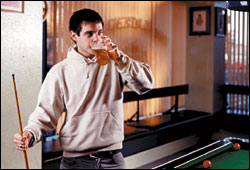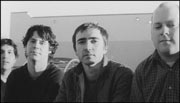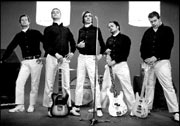THE WALKMEN
HOT HOT HEAT, HINT HINT
Graceland, 206-381-3094, $10 adv.
9 p.m. Fri., Jan. 24
THE TWO CLEAN-CUT young men sitting at the bar look right at home among the chattering Young Urban Professionals that surround them in a cozy, well-lit pub on Manhattan’s Upper West Side. The fact that they’re members of the exclusive group of quintessentially “downtown” bands currently soaking up excess gallons of breathless media ink seems to concern them not at all—a point indicated by both their conservative dress (tr賠prep-school chic) and decidedly un-“cool” choice of meeting spot. Unlike their contemporaries, the Walkmen—represented tonight by singer Hamilton Leithhauser and bassist Peter Bauer—seem to bother very little with the more prominent physical markings of their tribe. As Leithhauser sings on “We’ve Been Had,” from the band’s full-length debut, Everyone Who Pretended to Like Me Is Gone: “Well I’m a modern guy/I don’t care much for the go-go, or the retro image I see so often.”
Which is not to say the Walkmen don’t enjoy downtime with friends the French Kicks or frequent bookings with current kings-of-the-scene Interpol—Bauer even attended high school with Les Savy Fav bassist and French Kiss Records founder Syd Butler. It’s just that several members of the band have seen it all before: As Jonathan Fire*Eater, they were feted and fawned over and Next-Big-Thinged right into failed major-labeldom and, eventually, extinction. Having climbed from the wreckage of that spectacular mid-’90s flameout, Walter Martin, Paul Maroon, and Matt Barick joined forces with childhood friends Bauer and Leithhauser nearly three years ago to form the somewhat arbitrarily named Walkmen.
“It was just on a list, and we picked it,” explains Leithhauser. “But I just found out that a walkman is like a thug, or like a gangsta rapper—the general term for a gangsta rapper in Rotterdam. And there’s a documentary coming out about Rotterdam hip-hop that’s called The Walkmen, so . . . ,” he laughs.
“All the ‘the’ bands [the Strokes, the Vines, the Yeah Yeah Yeahs, etc., ad nauseam] sort of started after us. I think it was because Jonathan Fire*Eater had a non-‘the’ name, and [no one] wanted to have a weird one again; we wanted to get as far away from it as possible.”
They also seemed to want to get as far away from the downtown/Brooklyn axis of cool as possible, establishing their own studio, Marcata Recording, in the upper reaches of Harlem; then again, maybe it was just cost considerations. “It was the only place we could afford to get studio space,” says Leithhauser. “When we set it up originally, we didn’t know how to use it or anything, and we had a friend who used to own a studio in Manhattan, and we got him to come in and sort of show us how everything worked.”
The resulting sound—a shimmering, melancholic distillation of bands ranging from late-period Joy Division to Lambchop gone cabaret, augmented by hazy, forlorn piano and guitar riffs—is determinedly homemade.
“A lot of our record we were feeling out as we went,” admits Bauer. “If you know the order the songs were recorded in—and it’s not in order on the record—you can really tell the difference as we went along. There’s some serious missteps in there, but the last song on the record, you can tell—it’s about three times as loud and clean,” he laughs.
The piano may be the band’s most distinctive feature, but it is, as neither hesitate to note, “a real pain in the ass” to travel with. “We have to [get] one every time we go somewhere and then drag it around,” says Bauer, “and it costs us a lot. We don’t do electronic keyboards, though. We used them one time in Greece, and it was OK, but you know . . . it wasn’t the same.”
The band’s other standout attribute, Leithhauser’s world-weary, unfiltered-cigarette vocals, is often cited as being reminiscent of early-U2 Bono—a comparison he begs to differ with. “This is my deepest secret I’ve never told: The whole time everyone’s saying I sound like Bono, I was trying to sound like Roy Orbison. No one gets it.”
“I think that has to be built in,” Bauer suggests kindly.
“Yeah,” says Leithhauser. “But I sure as hell try.”









